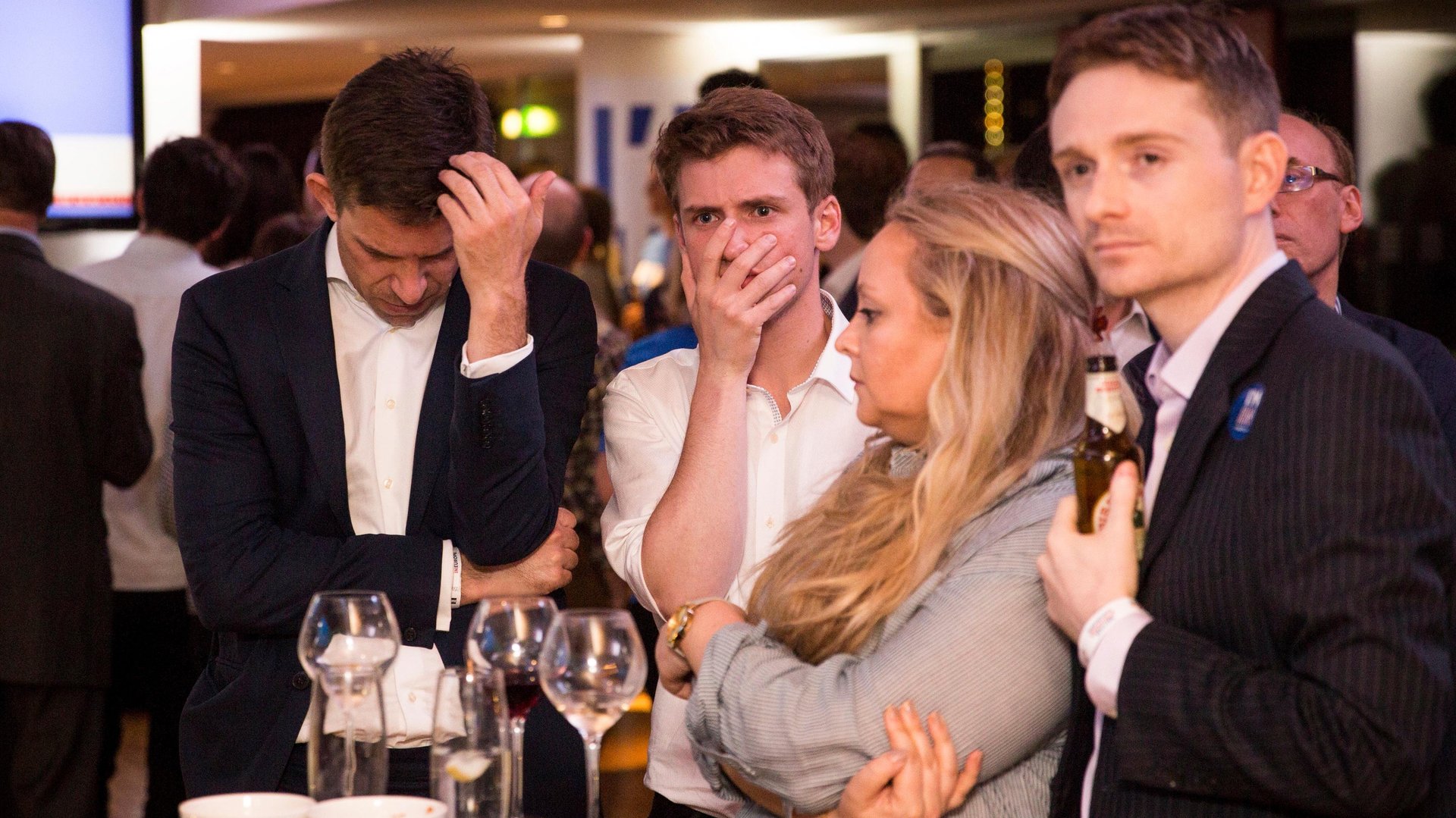Brexit is what happens when our digital lives seem more “real” to us than our real ones
It seems that few people were more stunned by last week’s Brexit results than the people who voted for it. Almost immediately, waves of regret—quickly coined “Bregret” (also the slightly more cumbersome “Regrexit”)—saturated the media.


It seems that few people were more stunned by last week’s Brexit results than the people who voted for it. Almost immediately, waves of regret—quickly coined “Bregret” (also the slightly more cumbersome “Regrexit”)—saturated the media.
First came a man named Adam, who said in an on-camera interview with the BBC, “I’m a bit shocked to be honest. I’m shocked that we actually have voted to Leave, I didn’t think that was going to happen.”
Adam, along with many others expressing their Bregret, appear to have fallen into the odd psychological trap of discounting the value of their own votes. People predicated their vote for Brexit on the illogical presumption that their vote did not matter. “My vote, I didn’t think was going to matter too much because I thought we were just going to Remain,” Adam continued, “and the David Cameron resignation has blown me away to be honest.”
A common theme throughout the aftermath of the Leave vote has been the apparently surprising onset of “reality.”
“I would go back to the polling station and vote to stay, simply because this morning the reality is kicking in,” student Mandy Suthi, who also voted to leave the European Union, told ITV News. Did Suthi not think all of her actions leading up and through the act of voting itself were a part of reality? Or is reality the moment when a person realizes her vote actually does matter?
There is so much Bregret that an online petition asking for a redo (created by a pro-Brexit voter prior to the results) has already amassed over three million signatures. Whether or not a second referendum is possible misses the underlying point. In this case, people only started to believe in reality when they faced the consequences–the equivalent of deciding to study for an examine only after you’ve failed it.
Voters’ confusion about the consequences of their actions is indicative of a larger trend. Civic-mindedness in the digital age increasingly seems to rely less on reason or facts and more on passion. In the case of Brexit, people voted emotionally. Many voters were fueled by a xenophobic nationalism reflective of a larger, global uptick in nationalist movements worldwide—including Trumpism in the US.
Worryingly, this lack of information has been obscured somewhat by an uptick in digital noise, especially on social media. According to The New York Times, there have been more than 11 million likes, shares, and comments on pro-Brexit Facebook pages—nearly triple the engagement on pro-Remain pages. Likewise, on Twitter there was “a substantial lead in leave-related hashtags over remain-related hashtags in May, suggesting there was more discussion on the ‘leave’ side,” the Times’ John Herrman notes, citing the analytics firm Talkwalker.
“Discussion” here seems to be a catch-all term for fear-mongering, hateful diatribes, and racist aggression. Fomenting emotions is a tried-and-true get out the vote strategy. But, as Bregret has demonstrated, reality is easily blinded by emotion.
When our daily lives take place primarily in the digital realm, indifference and ephemerality can sneak their way into arenas where they don’t belong. Media culture privileges snark, insult, “drags,” and “burns,” which is fine for Twitter. But that same attitude has consequences when applied in the concrete world. In some ways, our minds have become materially conditioned to mindless actions—things that can be deleted or edited or ignored.
Brexit is what happens when our civic mindedness has transmuted into an ethics of irresponsibility, of feigning indifference or ignorance. One commenter at the Daily Mail tossed all grammar aside in their panicked realization about Brexit: “I’m very worried now … the stark reality has hit home we are unnerved that actually this maybe wasn’t a good idea after all.” Willful ignorance is typically reserved for children. Yet we are now seeing voters using ignorance as a way to both absolve themselves of accountability and demand a “redo.”
Ironically, a redo may not even be needed. Many of the lead leavers are backing away from the campaign rhetoric they used to garner support for Brexit. Slate’s Gabriel Roth wrote an incisive piece outlining a number of scenarios that could prevent Brexit from happening at all.
Let’s hope the fallout from Brexit incites more than the British imagination to craft witty hashtags. The vote has shown that political disaster can happen anywhere.